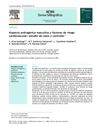 23 citations,
April 2010 in “Actas Dermo-Sifiliográficas”
23 citations,
April 2010 in “Actas Dermo-Sifiliográficas” Men with early-onset baldness have a higher chance of heart disease and clogged arteries.
 20 citations,
December 1997 in “Clinical Endocrinology”
20 citations,
December 1997 in “Clinical Endocrinology” Spironolactone may help reduce hair loss in androgenic alopecia.
 18 citations,
February 2006 in “Brain & development”
18 citations,
February 2006 in “Brain & development” A patient with Satoyoshi syndrome improved with a treatment combining several medications, including carbamazepine and methotrexate.
 15 citations,
August 2017 in “Scientific Reports”
15 citations,
August 2017 in “Scientific Reports” Young men with early hair loss have slightly worse blood sugar and fat levels, suggesting possible health risks and need for monitoring.
 13 citations,
June 2015 in “International Journal of Dermatology”
13 citations,
June 2015 in “International Journal of Dermatology” Non-obese women with hair loss have higher heart disease risk.
 12 citations,
January 2016 in “Journal of Clinical and Investigative Dermatology”
12 citations,
January 2016 in “Journal of Clinical and Investigative Dermatology” Low vitamin D levels are common in people with Alopecia Areata.
 8 citations,
July 2014 in “General and Comparative Endocrinology”
8 citations,
July 2014 in “General and Comparative Endocrinology” Finasteride affects frog testes by increasing testosterone, decreasing 5α-DHT, and impacting genes related to reproduction and other functions.
 7 citations,
January 2021 in “The journal of gene medicine”
7 citations,
January 2021 in “The journal of gene medicine” Certain genetic differences may affect how likely someone is to get COVID-19 and how severe it might be.
 7 citations,
December 2017 in “Open Access Macedonian Journal of Medical Sciences”
7 citations,
December 2017 in “Open Access Macedonian Journal of Medical Sciences” Biofibre® hair implants are safe and effective for alopecia when proper procedures are followed, with high patient satisfaction.
 5 citations,
October 2016 in “European Journal of Obstetrics & Gynecology and Reproductive Biology”
5 citations,
October 2016 in “European Journal of Obstetrics & Gynecology and Reproductive Biology” Women with PCOS may have a higher risk of respiratory and ear infections due to slower nasal mucociliary clearance.
 5 citations,
June 2015 in “British Journal of Dermatology”
5 citations,
June 2015 in “British Journal of Dermatology” A certain medication improved severe itching in a boy with liver and bowel disease by reducing histamine levels, suggesting a new treatment target.
 5 citations,
April 2014 in “The American Journal of Dermatopathology”
5 citations,
April 2014 in “The American Journal of Dermatopathology” Foreign-body granuloma may be a marker for late-stage Lichen Planopilaris and should be considered in diagnosis.
 4 citations,
June 2013 in “The Journal of Rheumatology”
4 citations,
June 2013 in “The Journal of Rheumatology” The document concludes that various findings in rheumatology offer insights into disease severity, treatment responses, and potential risks in medication, with some limitations due to unspecified participant numbers.
 4 citations,
December 1997 in “Clinical Endocrinology”
4 citations,
December 1997 in “Clinical Endocrinology” Spironolactone may help reduce hair loss in androgenic alopecia.
 3 citations,
August 2021 in “Cutis”
3 citations,
August 2021 in “Cutis” Some alternative medicine treatments might work for skin conditions, but their effectiveness and safety differ a lot.
 3 citations,
February 2016 in “Endocrinology and Metabolism Clinics of North America”
3 citations,
February 2016 in “Endocrinology and Metabolism Clinics of North America” Manage women's cholesterol with diet, exercise, and careful treatment choices, especially during pregnancy, PCOS, and menopause.
 2 citations,
February 2021 in “International Journal of Environmental Research and Public Health”
2 citations,
February 2021 in “International Journal of Environmental Research and Public Health” Women with PCOS tend to be less optimistic than those without it.
 2 citations,
October 2008 in “The Journal for Nurse Practitioners”
2 citations,
October 2008 in “The Journal for Nurse Practitioners” The document concludes that managing PCOS requires a comprehensive approach, including lifestyle changes and medication, to improve symptoms and reduce health risks.
 2 citations,
January 2004 in “Medical Hypotheses”
2 citations,
January 2004 in “Medical Hypotheses” Hidden fungal infections might cause heart disease and clogged arteries.
 1 citations,
January 2024 in “Curēus”
1 citations,
January 2024 in “Curēus” Upadacitinib significantly improved a man's severe scalp condition when other treatments failed.
 1 citations,
March 2018 in “BMJ case reports”
1 citations,
March 2018 in “BMJ case reports” Dilated pupils can be an early sign of HIV/AIDS.
 April 2024 in “Cell death and disease”
April 2024 in “Cell death and disease” Long COVID causes various long-term health issues and needs better awareness and treatment.
 March 2024 in “PLoS medicine”
March 2024 in “PLoS medicine” Physical activity, height, and smoking affect prostate cancer risk.
 February 2024 in “Journal of Health Science and Medical Therapy”
February 2024 in “Journal of Health Science and Medical Therapy” ADAM17 could be a potential target for treating PCOS.
 December 2023 in “Intisari Sains Medis”
December 2023 in “Intisari Sains Medis” SLE and DM can coexist but are rare and need careful evaluation.

Women with PCOS are at higher risk for gum disease, and managing shared risk factors can help both conditions.
 July 2022 in “International journal of medical science and clinical invention”
July 2022 in “International journal of medical science and clinical invention” Women with irregular periods should be checked for PCOS and treated early to prevent complications, with birth control pills helping to manage symptoms.
 June 2022 in “Rheumatology research”
June 2022 in “Rheumatology research” Lupus can be a rare cause of high calcium levels in the blood.
 March 2021 in “Research Square (Research Square)”
March 2021 in “Research Square (Research Square)” Patients with RASopathies have a higher risk of autoimmune disorders and should be routinely screened.
 September 2020 in “Annals of the National Academy of Medical Sciences. India”
September 2020 in “Annals of the National Academy of Medical Sciences. India” COVID-19 can cause skin issues like "COVID toes," rashes, hair loss, and hand eczema, and dermatologists are important for recognizing these signs.






























